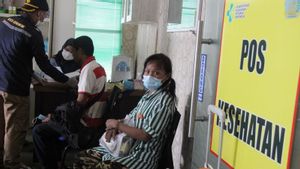JAKARTA - Deputy Speaker of the Indonesian House of Representatives Cucun Ahmad Syamsurijal highlighted the Government's plan to raise the Value Added Tax (VAT) rate to 12 percent by 2025. Cucun is worried that the increase in VAT rates even though it is only 1 percent, it will have an impact on people's welfare because tax increases will have a domino effect or a derivative effect.
"Actually, I have been concerned about the Government's plan to increase VAT to 12 percent for a long time. Since the last DPR period, I have encouraged the plan to be reviewed," said Cucun Ahmad Syamsurijal, Tuesday, November 19.
VAT to 12 percent is a mandate from Law Number 7 of 2021 concerning Harmonization of Tax Regulations (HPP). Value Added Tax (VAT) itself is a tax imposed on every Taxable Goods Sales transaction (BKP) and/or Taxable Services (JKP) carried out by Taxable Entrepreneurs (PKP).
VAT is an indirect tax, which means that consumers pay it to sellers, but then it is deposited by sellers to the state treasury. Cucun assessed that the 12 percent VAT increase is counterproductive in efforts to improve people's welfare considering the objective conditions of the community and the national economy which are currently full of dynamics.
"Because many will be affected by the 12 percent VAT increase policy, both for the general public and for the company's income which will result in employee salaries," he said.
According to Cucun, there are at least three reasons why the increase in VAT in 2025 needs to be reviewed. First, the VAT imposed on the sale and purchase of Taxable Goods (BKP) and/or Taxable Services (JKP) has a direct impact on people's purchasing power.
SEE ALSO:
With the increase in VAT rates to 12 percent, the price of goods and services will automatically also increase. This has the potential to reduce people's ability to buy goods and services.
"Especially for the poor and vulnerable groups, who have limitations in spending. When commodity prices are good, the burden on the lower class is getting heavier," explained Cucun.
"Of course this should be avoided, especially since poverty and unemployment are getting higher. We are worried that the increase in prices will make it more difficult for the community, even though the country's homework is still large, especially in terms of the people's economy," he continued.
Furthermore, Cucun said that VAT is an indirect tax that imposes a tax burden on consumers (destinataries). With the increase in tariffs to 12 percent, the tax burden borne by consumers will be even greater.
"This condition will reduce people's purchasing power, which in the end can slow economic growth," said Cucun.
"This includes the middle class and workers with equivalent income of UMR. The increase in VAT rates will make them refrain from reducing domestic consumption," he added.
Even though domestic consumption has contributed greatly to Indonesia's economic growth. The increase in living expenses is also considered to be even more burdensome for the middle class because the group is currently under pressure from economic conditions so that not a few have dropped their caste.
"It must also be seen how the pressure of conditions due to the increase in VAT will not only have an impact on the community's economic factors, but also in terms of psychology and community emotions," explained Cucun.
Finance Minister Sri Mulyani said the increase in VAT rates from 11 percent to 12 percent was needed, one of which was to maintain the health of the State Revenue and Expenditure Budget (APBN). Even so, Cucun reminded that the increase in VAT rates also has the potential to increase the inflation rate.
The English, Chinese, Japanese, Arabic, and French versions are automatically generated by the AI. So there may still be inaccuracies in translating, please always see Indonesian as our main language. (system supported by DigitalSiber.id)
















